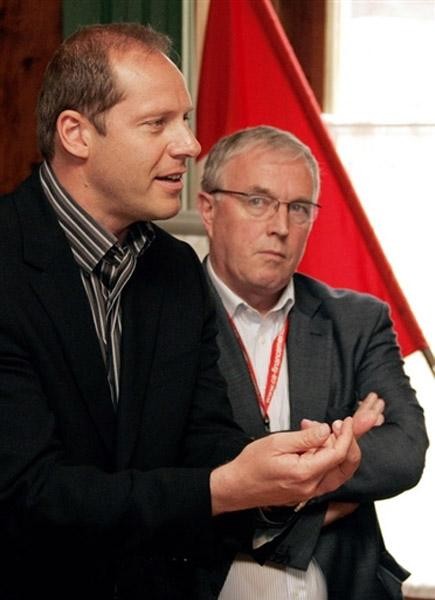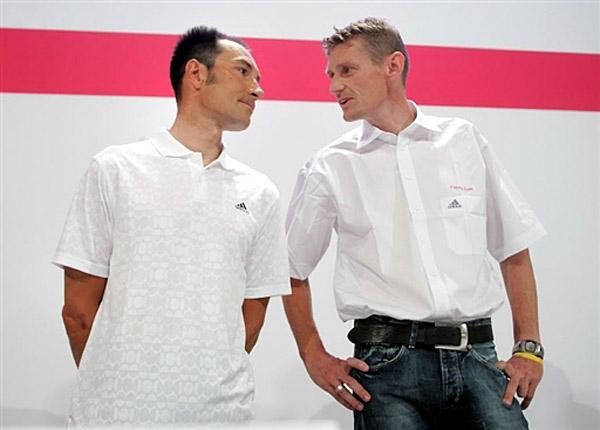Tour director speaks out on doping establishment
The past twelve months have been difficult for the sport of cycling, to make a vast understatement....


News feature: May 25, 2007
In a week that marked the one year anniversary of the start of the Operación Puerto affair, some of the biggest names in cycling are now 'coming clean' about their doping history, and the months leading up to the Tour de France have once again been embroiled in doping drama. Cyclingnews' Laura Weislo and Jean-François Quénet report on how the leaders of the sport's biggest race view the current situation.
The past twelve months have been difficult for the sport of cycling, to make a vast understatement. From the initial shock of the 58 riders named in Operación Puerto and the exclusion of riders from the 2006 Tour, to Floyd Landis' doping positive and subsequent public war with the antidoping establishment, 2006 was a bleak year. However, recent events seem to indicate that a corner has been turned in the fight against doping, and several riders - Erik Zabel, and his former team-mates Rolf Aldag, Bert Dietz and Christian Henn - have admitted to using drugs.
Tour de France bosses Patrice Clerc (ASO president) and Christian Prudhomme paid a visit to the Giro d'Italia on the day the race crossed over into France, using some of the roads made famous in both Grand Tours. The Tour director seemed optimistic about the recent events. "It's the end of an hypocritical system put in place back at the end of the 90's when a miserable cycling was run by Hein Verbruggen, the UCI president at the time," Prudhomme stated.
Prudhomme had harsh words for those from the 'old guard' who are still involved in the sport. "Not only the riders have to pay for the doping culture that we have to get rid of. Those at the command of the teams, whether they have cheated or not, they have to pay as well. Either they have cheated and they must be kicked out, or they have not cheated, but if there have been many problems inside their team, it means they don't have the skills for the job and cycling can't keep them. We must restore credibility and dignity in this magnificent sport."
Pointing his fingers at the team management is a change for a sport which has in the past isolated and vilified the riders. "The fear has changed camp," Prudhomme said. With sponsors also fearing negative publicity from doping scandals, the
Speaking to the Associated Press from the Volta a Catalunya, Prudhomme sees the recent admissions as a step in the right direction, but not the definitive nail in doping's coffin. "The law of silence is not totally broken, but the wall is crumbling," Prudhomme declared. "There is an old culture of doping in cycling. What we need today is to break the system."
Get The Leadout Newsletter
The latest race content, interviews, features, reviews and expert buying guides, direct to your inbox!
"I think that for years the UCI wanted to build a system which was based on economic arguments," Prudhomme said. "And that's one of the reasons for the current crisis." He suggested that the UCI deserved a "Golden Ostrich" award for hiding its head in the sand for so many years.
Coming one year after 58 riders were linked to a massive blood doping ring centred at the Madrid clinic of Dr. Eufemiano Fuentes and just weeks after Italian star Ivan Basso admitted his involvement in the affair, the admissions of the former Team Telekom riders are seen by many as just the first of a number of dominoes to fall.
The avalanche of honesty by T-Mobile/Telekom mates Rolf Aldag and Erik Zabel, Gerolsteiner director Christian Henn and former pro Bert Dietz followed the publication of excerpts from a tell-all book by former Team Telekom soigneur Jeff d'Hont which were published in a German magazine Spiegel. d'Hont claimed that team doctors provided doping products including EPO to the riders starting in 1996, leading to the same doctors, Lothar Heinrich and Andreas Schmid, being fired from their positions as heads of T-Mobile's antidoping program. Both later admitted that they did indeed dope their riders.
All four riders admitted to taking doping products, including Zabel, who admitted using EPO prior to the 1996 Tour de France, which was won by this then team-mate and current Team CSC director Bjarne Riis. Riis has called a press conference for Friday in Denmark.
Prudhomme expressed his frustration over doping in the sport in an interview earlier in the week with La Vanguardia, saying, "A voluntary desire to change doesn't exist. Cycling doesn't need doping - it's killing the legend. It's killing cycling."
Prudhomme also lamented the fact that despite concerted efforts to increase controls and to catch the cheaters, the sport still finds itself in a crisis. "In 10 years, cycling has done more in the fight against doping than all other sports combined, but it hasn't worked."
The confessions of Basso and the Team Telekom riders is a positive step, and Prudhomme said that the federations should give leniency to those who admit guilt, but use a firm hand on those who don't. "It can't be the same sanction for those who admit it and those who never admit it," Prudhomme said. "For those who never admitted it and are then found out by tests ... life (ban), over."
Still, the admission of Basso, who confirmed his involvement with Fuentes but then later backed down and claimed the blood bags were to be used in the Tour de France, a race he was banned from starting, didn't fully satisfy the director. "When I read the confessions of Basso on Monday evening, I said to myself 'finally,"' Prudhomme said. After Basso claimed he really hadn't doped, but had merely intended to, "I was less happy the next day... he took two steps forward and two steps back
Earlier this year, Classics star Johann Museeuw admitted to taking banned substances during his career, but expressed his desire to try to clean up the sport, saying "I did things that weren't appropriate. I'll keep fighting for a clean sport but I can't put right what has been done."
As part of a three-organisation coalition to battle doping, Prudhomme, UCI president Pat McQuaid and IPCT president and Quickstep director Patrick Lefevere have set out to increase random doping controls in an attempt to catch more riders. The UCI will perform 160 random tests during May and June, up more than fivefold from last year's 30.
The UCI has routinely performed random blood screenings prior to major races, testing the hematocrit levels of the riders throughout the season. Normal values for healthy men are below 46, yet riders have routinely tested between this normal value and the UCI cut-off of 50. Recent tests of Spanish juniors found ten riders between 48 and 50%, and excluded one from the race who had a reading of 51%.
Despite a test for EPO being available since the year 2000, doping still goes on under the radar, and Prudhomme thinks that it is imperative that it be stopped now. "If we don't break the system, tomorrow there will be other Basso's, other Ullrich's," Prudhomme said. The sentiment was echoed by Erik Zabel's concern for his own son who has taken up the sport, something he made clear at his press conference. "He rides, too. I don't want him to find himself in a position like I did."
The 2006 Tour de France had many cycling fans feeling that, post-Operación Puerto, they were finally seeing 'clean cycling' for the first time. Following Floyd Landis' implosion on stage 16, his miraculous return in stage 17 was hailed as the most exciting Tour exploit in modern history. Of course, opinions of Landis took a drastic turn once it became public that he tested positive for testosterone that day.
Despite Landis' lawyers and expert witnesses providing compelling testimony which shed uncertainty on the test results which showed him positive for synthetic testosterone on that infamous stage, Prudhomme said he still felt betrayed by Landis, "It was another betrayal, and a terrible one," he said.